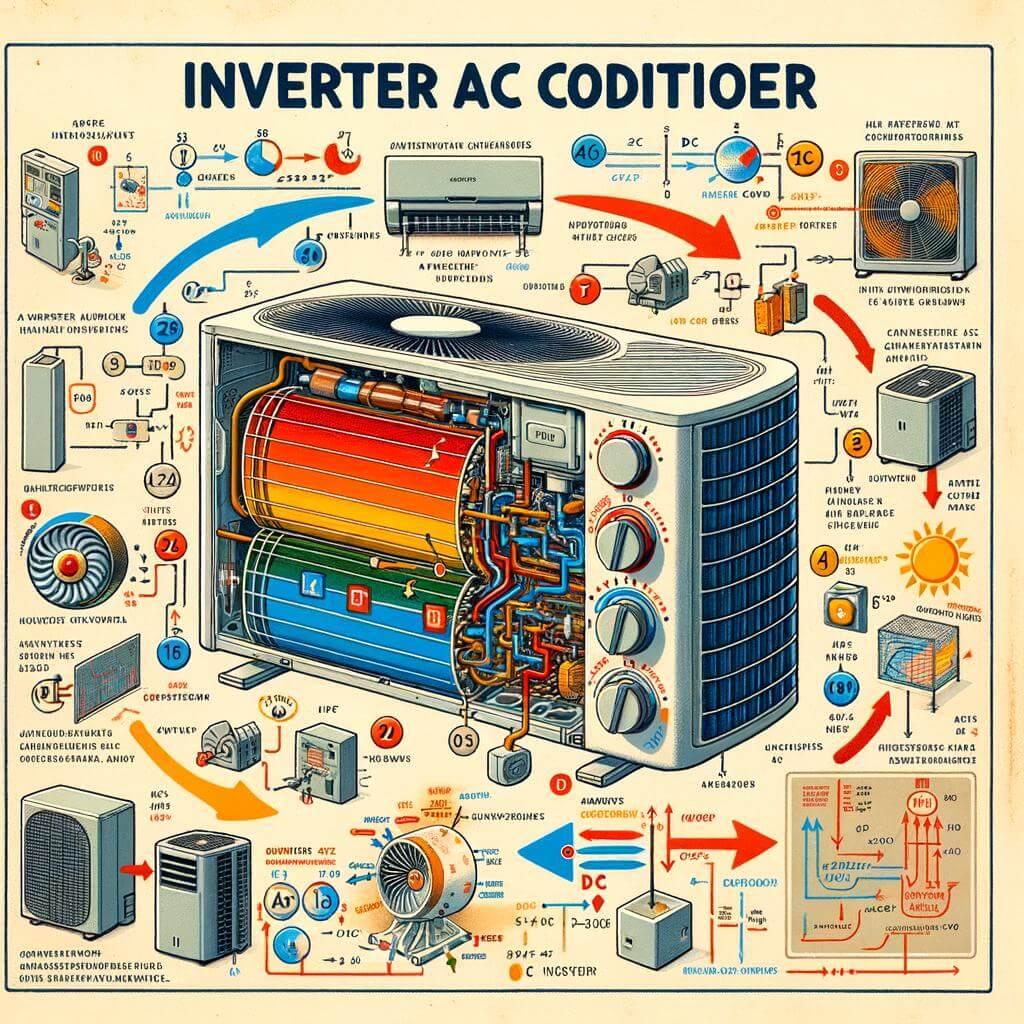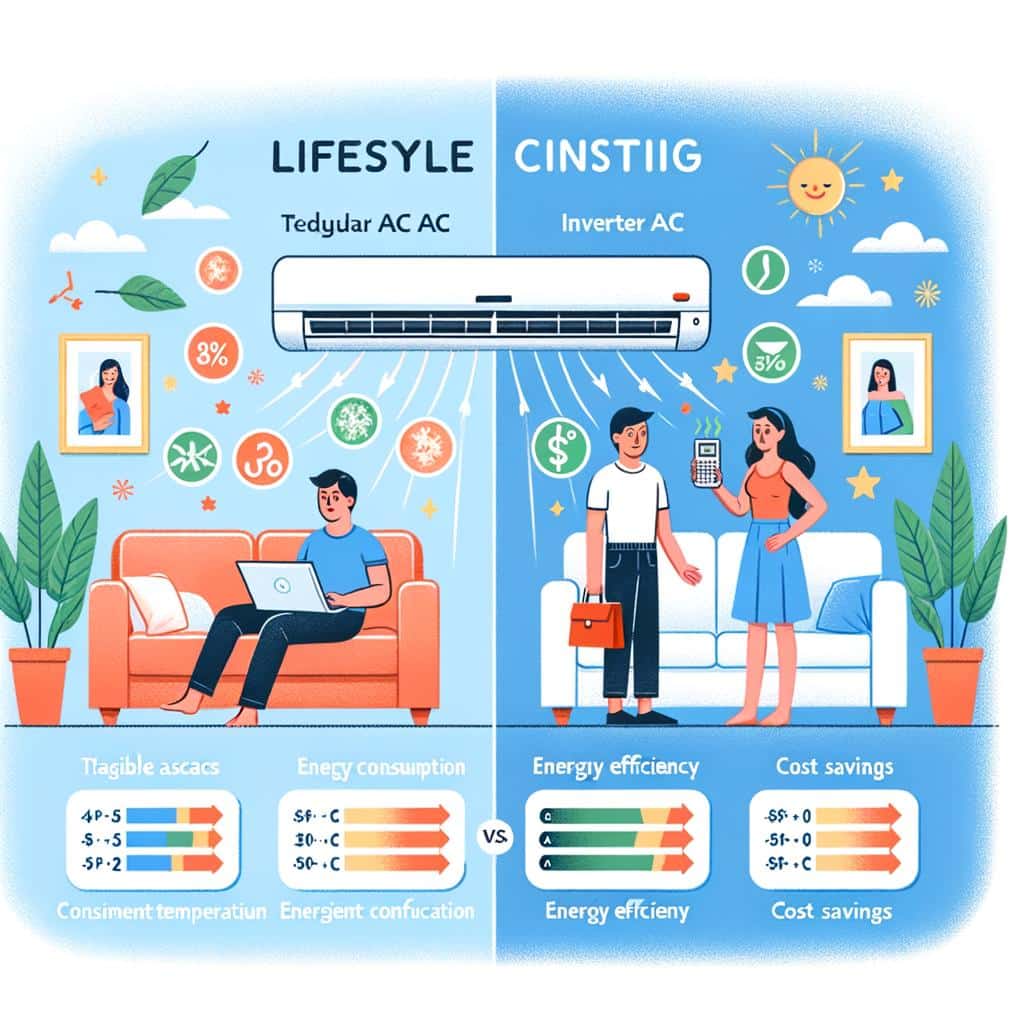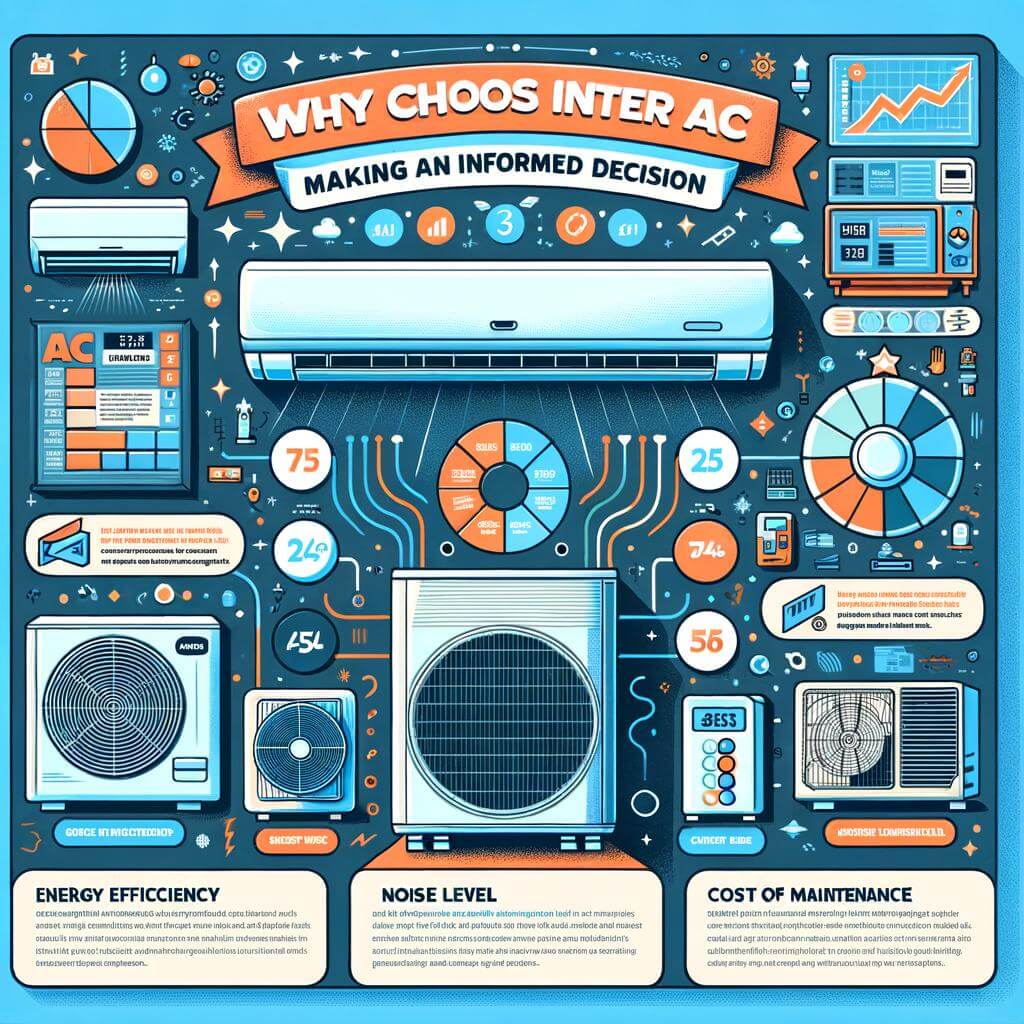As the heat rises and beads of sweat make their unwanted appearance, we reach vigorously for our trusted line of defence – the remote control. With a single click, we engage the wondrous contraption to transform our homes into our very own snowy sanctuaries. Such is the magic and value of our good old air conditioner. But as we continue to spearhead into the future, a cool change is perceptible in the realm of these frosty fortresses. A new, energy-efficient knight is claiming the crown – Inverter ACs. This game-changer is giving the conventional cooling units a run for their money. Buckle up to explore the icy tundra battle grounds between the innovative Inverter ACs and the traditional units – it’s time to embrace the chilling adaptability of change. Ice meets innovation, dear reader. Are you ready to chill out?
Understanding the Basics: Inverter ACs and Traditional Units
The perspective of modern cooling technology has been revolutionized with the advent of Inverter Air Conditioners. This latest tweak in AC technology offers potential benefits in terms of efficiency and cost savings over the long haul, making them increasingly popular among savvy customers. Inverter ACs function on the principle of variable speed motor, which continuously regulates the compressor speed according to room temperature, unlike traditional units that operate on an all-or-nothing principle. Their primary advantage lies in minimizing energy consumption, which in turn reduces utility bills. When comparing Inverter ACs and Traditional Units, the former have an edge over in several aspects:
- Efficiency: Inverter ACs offer higher efficiency as they adjust their speed depending on the cooling requirements of the room. Due to these variations, the unit operates closer to the desired temperature, reducing fluctuations and thus cutting energy consumption.
- Cost Saving: Though Inverter ACs are typically more expensive to purchase, over time they lead to savings on electricity bills.
- Faster Cooling: With constant speed regulation, Inverter ACs can cool a room faster than a traditional unit.
| Inverter ACs | Traditional ACs | |
|---|---|---|
| Efficiency | High | Lower |
| Cost Saving | Long term | Short term |
| Speed of Cooling | Faster | Slower |
However, while Inverter ACs outshine Traditional ACs based on the listed parameters, they may not be the most cost-effective solutions for all applications. For those who use air conditioning sparingly or have a tight budget, traditional units may still prove more viable. Thus, the choice between Inverter ACs and Traditional Units depends upon individual needs and circumstances.
Exploring the Mechanisms: How Does Inverter AC Work?
The core of an inverter AC’s effective and efficient operation is the variable-frequency drive that converts the AC’s incoming power source into a DC (Direct Current). From there, an inverter utilizes IGBTs (Insulated-Gate Bipolar Transistors) to regulate the frequency of the current. All this may sound complex, but the implications are simple and profound.
- Flexibility: Traditional air conditioning units operate in a binary state – they’re either fully on, blasting out cool air at maximum power, or they’re inactive. In contrast, an inverter AC can regulate its cooling output according to the ambient temperature. Thus, the appliance uses less power when it operates, providing considerable energy savings.
- Quiet Operations: One of the fringe benefits of this soft operational approach is that an inverter AC functions more quietly than its traditional counterpart. This reduced noise is a substantial plus for users who appreciate peace and quiet.
- Longevity: An inverter AC usually lasts longer than a traditional one due to less rigorous operations. As it modulates output according to need, it suffers lower wear and tear over time.
| Specification | Inverter AC | Traditional AC |
|---|---|---|
| Power Usage | Lower | Higher |
| Noise | Quieter | Louder |
| Lifespan | Longer | Shorter |
The performance benefits of inverter technology can significantly upgrade your experience of keeping cool in sweltering heat. It’s no surprise that as energy costs rise and consumers become more environmentally conscious, inverter ACs are becoming an increasingly popular choice.
The Traditional ACs: An Overview of Function and Performance
Before we delve into the comparison between inverter ACs and traditional units, let’s shed some light on traditional air conditioners. Used widely around the globe, traditional ACs haven’t lost their appeal entirely despite the advent of newer, more energy-efficient models. Operating based on a simple mechanism, these ACs kick into gear when the room temperature surpasses the thermostat setting. The entire unit is activated and it runs at full capacity, cooling the room rapidly. These units run until the room temperature falls below the set thermostat setting, upon which they switch off entirely.
A few salient features of the traditional ACs typically include:
- Intermittent operation: Their on and off cycle contributes to constant temperature fluctuations inside the room.
- Affordability: Traditional ACs are generally less expensive, making them a financially viable choice for many.
- Simplicity: This air conditioning option is easy to understand and straightforward to manage. However, it’s worth noting that this simplicity also leads to its primary drawbacks.
- Energy consumption: Traditional ACs usually consume more energy as they run at full capacity, and the constant on and off cycling can take a heavy toll on the unit, leading to more frequent maintenance and replacements.
The table below enlists some key features and ratings of popular traditional AC brands:
| Brands | Energy Efficiency (EER) | Noise Level (dB) | Life Expectancy (Years) |
|---|---|---|---|
| Brand A | 8.5 | 56 | 10-15 |
| Brand B | 9.2 | 52 | 12-15 |
| Brand C | 10.0 | 48 | 15-20 |

Evaluating Energy Efficiency: A Comparative Analysis
When it comes to energetic efficiency, the Inverter Air Conditioning Unit presents a clear landslide when compared to its traditional counterparts. Inverter AC units function at varying speeds and capacities, which allows them to maintain a consistent temperature in your home, thus decreasing energy surges and saving you money on your energy bills. On the other hand, traditional units operate at a fixed rate, ultimately guzzling down more energy.
To better understand and quantify the difference between these two types of air conditioning units, let’s make use of the following comparative analysis:
| Criteria | Inverter AC Units | Traditional Units |
|---|---|---|
| Operating Speed | Variable | Fixed |
| Power Consumption | Low | High |
| Climate Control | Consistent | Inconsistent |
From this comparative analysis, it comes as little surprise that Inverter AC units are increasingly becoming the preferred choice for most homeowners seeking a cost-effect and efficient cooling solution. In addition to their energy-efficiency, these types of AC units are also generally quieter in operation, adding a measure of comfort beyond just temperature moderation.
The Verdict
- Inverter AC Unit: Excels in managing power usage which results in lower utility bills. It also provides consistent temperature regulation for heightened comfort.
- Traditional Unit: May be inexpensive upfront but may fall short in terms of energetic efficiency and climate control.
In conclusion, the ultimate choice of AC unit, whether traditional or inverter, largely depends on your specific needs, size and layout of your home, and your budget. It is always advisable to consider the entire lifecycle cost, including maintenance and energy costs, to make the best long-term decision.

Comfort and Cost: Lifestyle Impact of Switching to Inverter ACs
What if you could drastically reduce your energy consumption while reaping the benefits of an optimal home climate? Switching to Inverter ACs from traditional cooling units is an excellent start. Inverter AC units operate at varying speeds, unlike traditional units that offer only full-speed operation. Hence, they adjust their cooling capacity to suit room conditions, leading to energy efficiencies that translate into substantial cost savings.
Imagine coming home on a sweltering summer day and enjoying the immediate coolness offered by a traditional AC only until the unit cycles off when the set temperature is reached. An Inverter AC, on the other hand, continually adjusts the cooling output maintaining a consistent temperature, ensuring you’re always comfortable.
- Energy Efficiency: Inverter units can save up to 50% more energy than classical models. Which means these units pay for themselves in energy savings alone!
- Quiet Operation: Inverter ACs operate quieter as they don’t always run at full speed.
- Constant Comfort: As the inverter AC units adjust their speed to manage temperature effectively, they create a consistently comfortable indoor environment.
| Feature | Inverter AC | Traditional AC |
|---|---|---|
| Energy Efficiency | High | Low |
| Noise Level | Low | High |
| Temperature Control | Precise | Varying |
Undeniably, the long-term benefits of Inverter ACs surpass their initial costs, marking a significant impact on your lifestyle by putting comfort and cost-efficiency within your reach.

Why Choose Inverter ACs: Making an Informed Decision
In the eternal quest for improved home comfort, you may come across the broader dialogue of Inverter ACs versus Traditional Units. But what sets an Inverter AC apart? Oh, just a few things, including energy efficiency, consistent cooling, quiet operation, and prolonged lifespan. Here are some specifics:
- Energy Efficiency: Inverter ACs adjust their speed according to the heat load in a room. Unlike traditional ACs that operate at full speed or not at all, inverter air conditioners significantly cut down power consumption.
- Consistent Cooling: No more inconsistent room temperature. The compressor speed of an Invertor AC is variable and hence provides a regulated, consistent temperature. Imagine an AC that cools more when it’s hotter and cools less when it’s cooler!
- Quiet Operation: Inverter ACs operate quietly thanks to the variable speed of the compressor. This is a blessing for those who value peace, calm, and a quiet cooling system.
- Prolonged Lifespan: Since they weather less on-off cycling, Inverter ACs face less wear and tear over time. Thus, they promise to serve you longer, eclipsing the lifespan of traditional units efficiently.
Now, let’s delve deeper, examining a side-by-side comparison of the potentials of an Inverter AC versus a Traditional AC unit.
| Criteria | Inverter AC | Traditional AC |
|---|---|---|
| Efficiency | Highly efficient | Less efficient |
| Operating Noise | Low | High |
| Lifespan | Long | Short |
| Temperature Regulation | Consistent | Varies |
In the end, it’s about choosing an appliance that aligns with your comfort, energy-saving goals, and noise tolerance. Considering all factors, Invertor ACs have a clear edge over traditional units as they epitomize the perfect blend of power efficiency, temperature control, quiet performance, and longevity. Venturing boldly into the winds of change, we’ve journeyed through the dazzling universe of AC technology. We’ve highlighted the stars of innovation and efficiency – the magnetizing inverter ACs, and cast a nostalgic light on the sturdy, beacon-like traditional units. Emerging from the chilling battle with a cool, new understanding, we realize again, the choice isn’t merely flicking a switch between old and new, but considering the unique climatic dynamics that adorn our own personal galaxies. As the curtain of frost descends on this cosmic exploration, we part with the empowering knowledge to make an informed choice, taking our quest for ideal temperature solutions in our homes and workspaces to the next level. Amid the silent hum of defined efficiency and the comforting whisper of familiar tradition, we leave you to embrace the cool change. Ultimately, whether you gravitate towards the innovative inverter ACs or decide to stick with the strength of traditional units, remember that the truest warmth comes from a cool, comfortable environment flowing seamlessly with our rhythms of life. In the ever-evolving tides of technology, making the right choice may just be the gentle breeze that sets a new course in your temperature-navigation journey.




